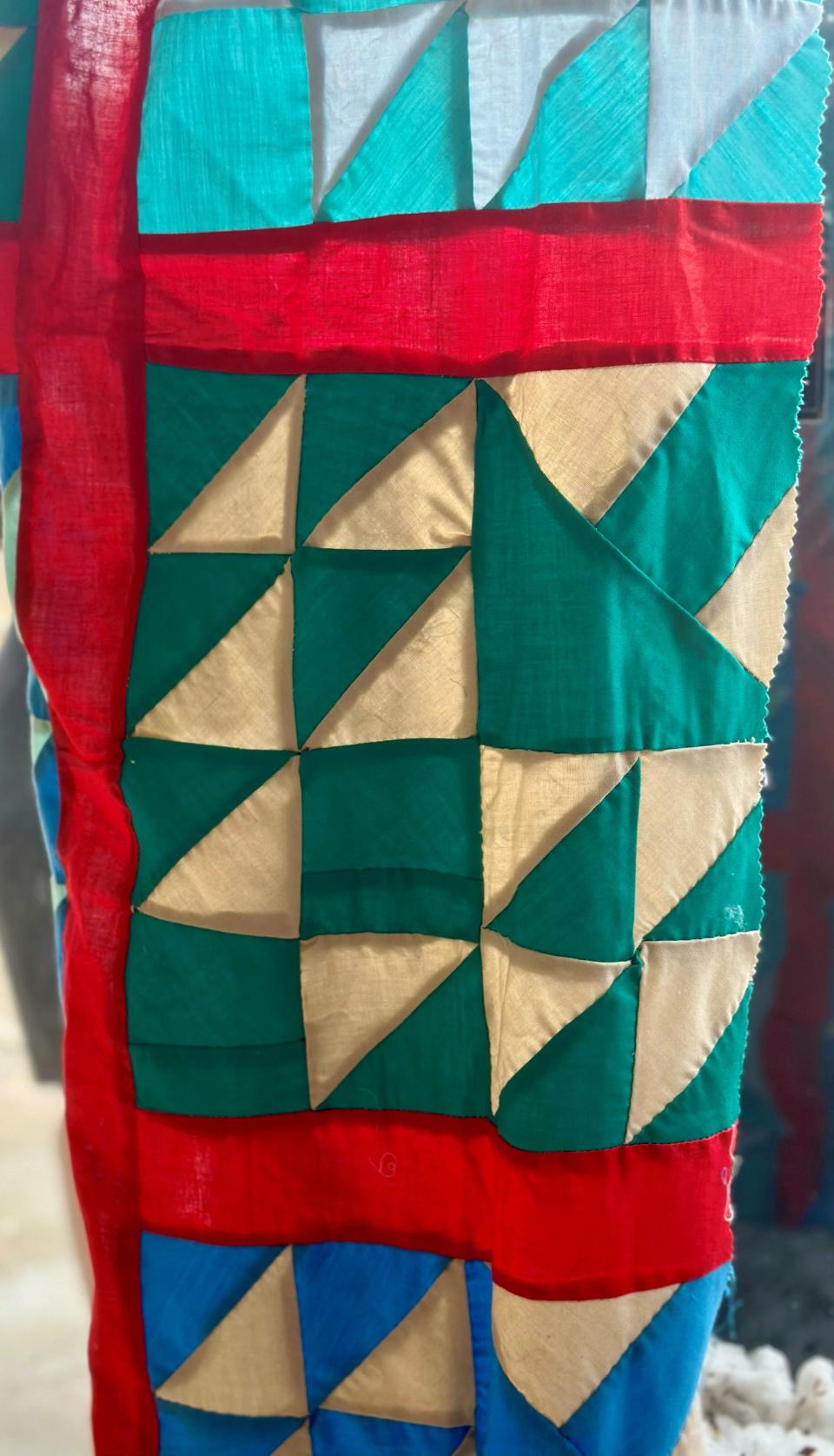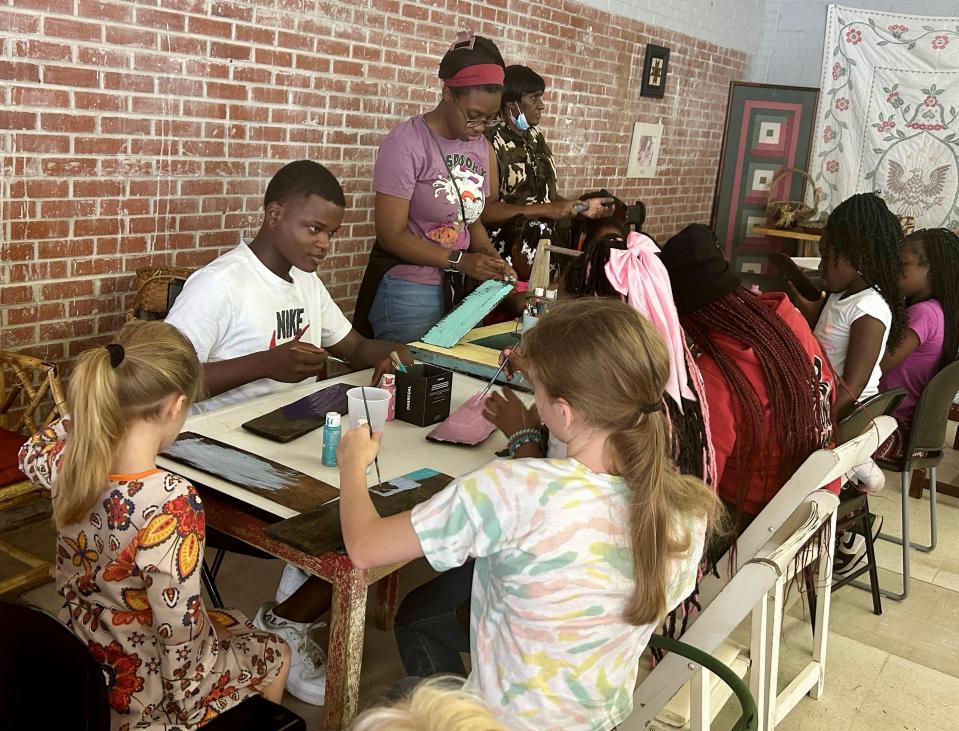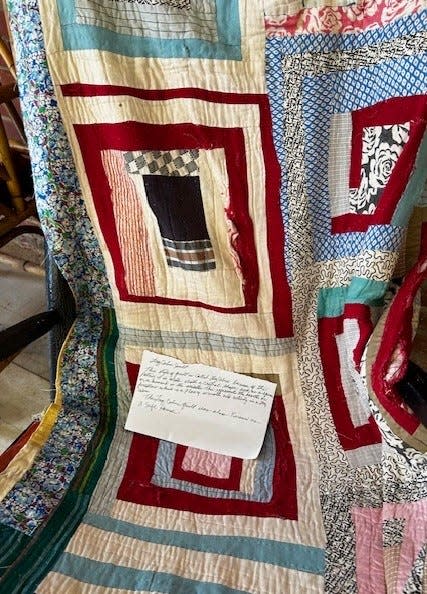Hidden messages connect colorful quilts to history at growing Camden Juneteenth event
This story is part of a partnership between the Montgomery Advertiser and the Living Democracy program at Auburn University. Now in its 13th year, the program disperses students across rural Alabama to spend 10 weeks learning more about the inner workings of the community and writing about what they observe.
CAMDEN − Since its humble beginnings in 2006, Betty Anderson's annual Juneteenth celebration in Camden continues to grow. What was once a small gathering in her home flourished, necessitating a move to a larger venue.
This year, the celebration moved to the old Ratcliffe building, drawing a diverse crowd of more than 100, including attendees from all corners of Alabama. Colorful quilts in a variety of patterns decorated the walls as dozens of children, visitors and senior citizens gathered.
Those quilts reflected the theme of the 2024 celebration as Anderson explained how quilt patterns became symbols for slaves escaping to freedom. She told the crowd that she was inspired to learn about those symbols based on the book “Hidden in Plain View: A Secret Story of Quilts and the Underground Railroad” by Jacqueline L. Tobin and Dr. Raymond G. Dobard.

Anderson shared that the book led her to research more about Harriet Tubman and how she made quilts, and how they were used as signs for slaves escaping to freedom. She walked the room, pointing to quilts on display, as she described the deeper meanings of quilt patterns and connected them to both Tubman and the significance of Gee’s Bend quilters in Wilcox County.
An excerpt from “Hidden in Plain View” explained, “As a fabric griot, the African American quilt is a communicator, conveying heritage as it once displayed a means for enslaved people to flee the plantation and journey to freedom. Communicating secrets using ordinary objects is a part of African Culture.”
More: Alabama linguist is fixin' to tell you what makes Wiregrass dialects unique
Juneteenth, which became a federal holiday in 2021, originated in Texas and commemorates the day when news of the Emancipation Proclamation reached the last group of enslaved African Americans in the United States, marking the end of slavery in the country.
Anderson said her ultimate hope for the Juneteenth celebration was to foster a deeper understanding and appreciation for quilts. Beyond their practical use as bedding, quilts played a significant role in African American culture. They were often used to tell stories, convey messages and preserve cultural traditions, making them a powerful symbol of resilience and resistance, Anderson noted.
One of several examples Anderson pointed out was the “Flying Geese” pattern. According to one account in “Hidden in Plain View,” the Flying Geese quilt provided slaves running North to freedom “cues on direction, time, and behavior.”

Another quilt she discussed was the Log Cabin quilt that features a shape in the middle representing the hearth or fireplace, a place of warmth. The “hidden” meaning indicated a safe house for those moving on the Underground Railroad.
When preparing for this year’s event, Anderson visited Southern Accents, a local antique shop. The shop owner, Caroline Vick Brooks, offered the quilts that once belonged to her relatives for the program. Those quilts, similar to those Anderson displays at her Camden Shoe Shop and Quilt Museum, provided the colorful backdrop.
Gee’s Bend quilters, her museum and other local quilters are all working together to keep the tradition of making handmade quilts going in Wilcox County, Anderson said.

Anderson noted that African American spirituals were also used as signals and inspiration for slaves hoping to escape. Christine Weerts of Selma opened the program explaining the significance of spirituals such as “Every Time I Feel the Spirit” and “Wade in the Water.”
Children from the Camden Youth Development Center were on hand to sing those and other songs. Other local teens from BAMA Kids also stepped up to perform. Helen Purnell and the Rev. Dr. McNair Ramsey also participated in the program, which was dedicated to the memory of Eugene Hudson.
The event was a true community endeavor, with local establishments like Jackson’s Station, Rack & Reels, Piggly Wiggly and Larry’s Drive-In providing sponsorship. The program concluded with a parade through the streets of Camden.
More: Falling for fashion: Childhood shopping with grandma spurs Camden woman to open boutique
Dr. Richard Bailey, a historian specializing in American history, said Juneteenth celebrations are significant in honoring and preserving history.
Anderson said she will continue to join others to host Juneteenth celebrations in Camden as it provides opportunities to celebrate history and culture.
Naomi Taylor, a Living Democracy student at Auburn University, is living and learning this summer in Camden, Alabama, as a Jean O'Connor Snyder Intern with the David Mathews Center for Civic Life. The nonprofit program, coordinated by the Caroline Marshall Draughon Center for the Arts and Humanities in the College of Liberal Arts, prepares undergraduate college students for civic life through living-learning experiences in the summer.
This article originally appeared on Montgomery Advertiser: Hidden messages connect quilts to history at Camden Juneteenth event

